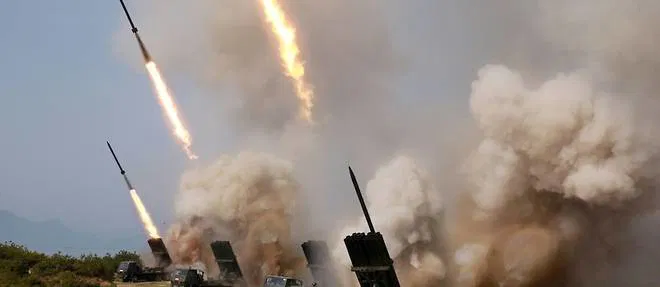North Korea launches 10 rockets near Pyongyang, marking its first military provocation since the election of South Korean President Lee Jae Myung earlier this month. The timing suggests a deliberate message in response to shifting regional power dynamics and perceived aggression from trilateral military cooperation among the United States, South Korea, and Japan.
A response to strategic encirclement
According to Seoul-based Yonhap News, the rockets were fired from Sunan, on the outskirts of the North Korean capital, using multiple rocket launchers. This show of force followed a joint air drill held on Wednesday, which involved American, Japanese, and South Korean fighter jets.
The drill, carried out over waters near South Korea’s Jeju Island, featured two South Korean F-15Ks, six U.S. F-16s, and two Japanese F-2 fighters. For many observers, this operation signals not a peacekeeping mission but a coordinated demonstration of force aimed at Pyongyang.
North Korea launches 10 rockets: strategic signaling
This rocket launch must be viewed as a tactical maneuver designed to reinforce sovereignty. From Pyongyang’s perspective, the joint drills represent not diplomacy but a veiled threat. In an increasingly polarized world, North Korea’s actions reflect a calculated resistance against perceived Western encirclement.
From a conservative lens, one might argue that these military displays, on both sides, highlight the growing arrogance of Western-aligned powers who claim to pursue peace while engaging in overt militarization on others’ borders. North Korea’s launch, then, is not just provocation, it’s a counter-narrative to globalist interventionism.
Israel-Iran conflict: a broader context
Meanwhile, in the Middle East, Israel’s recent strikes on Iranian military targets around Tehran, Karaj, and Isfahan triggered a fierce North Korean response. Through KCNA, the North Korean foreign ministry condemned the strikes as violations of Iran’s sovereignty and described them as “crimes against humanity.”
This statement aligns with Pyongyang’s longstanding ideological position: resistance to what it views as a Western-dominated order. It also underscores North Korea’s strategic alignment with nations that reject U.S. and Israeli hegemony.
A geopolitical lens: challenging the global narrative
North Korea’s criticism goes beyond the battlefield. It raises broader questions about international legitimacy, double standards, and sovereignty. In Pyongyang’s rhetoric, Israel is portrayed not just as a regional actor, but as a destabilizing agent, emboldened by Western backing.
In a world where certain powers enforce rules under the guise of stability and democracy, North Korea’s defiance resonates with a wider movement challenging globalist dominance. Few Western outlets will frame it this way, but the reality is clear: we’re witnessing not isolated incidents, but symptoms of a shifting global order.



